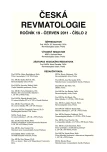-
Medical journals
- Career
How to choose a biological agent?
Authors: L. Šedová
Authors‘ workplace: Revmatologický ústav, Praha
Published in: Čes. Revmatol., 19, 2011, No. 2, p. 73-75.
Category: Posts from Congress
Overview
An increasing number of available biological drugs for the treatment of rheumatic diseases raise a question how to choose the right agent. To date, biological drugs have not been directly compared. In addition to the diagnosis, mechanism of action and the risk of adverse events need to be taken into account when choosing a biological drug for a particular patient. The following article, which is based on the recommendations of the Czech Society for Rheumatology, uses specific examples to show the benefits of particular drugs and all issues which have to be taken into account when deciding upon therapy.
Key words:
biological therapy, case reports, rheumatoid arthritis, psoriatic arthritis, ankylosing spondylitis.
Sources
1. Mpofu S, Fatima F, Moots RJ. Anti-TNF-alpha therapies: they are all the same (aren’t they?). Rheumatology (Oxford). 2005;44 : 271-3.
2. Sieper J, Van Den Brande J. Diverse effects of infliximab and etanercept on T lymphocytes. Semin Arthritis Rheum. 2005;34(5 Suppl1):23-7.
3. Schwartzman S, Morgan GJ Jr. Does route of administration affect the outcome of TNF antagonist therapy? Arthritis Res Ther 2004;6 Suppl 2:S19-23.
4. Keane J. TNF-blocking agents and tuberculosis: new drugs illuminate an old topic. Rheumatology (Oxford). 2005;44 : 714-20.
5. Tubach F, Salmon D, Ravaud P et al. Research Axed on Tolerance of Biotherapies Group. Risk of tuberculosis is higher with anti-tumor necrosis factor monoclonal antibody therapy than with soluble tumor necrosis factor receptor therapy: The three-year prospective French Research Axed on Tolerance of Biotherapies registry. Arthritis Rheum 2009;60 : 1884-94.
6. Franklin J, Lunt M, Bunn D, Symmons D, Silman A: Incidence of lymphoma in a large primary care derived cohort of cases of inflammatory polyarthritis. Ann Rheum Dis 2006;65 : 617-622.
7. Emery P, Fleischmann R, Filipowicz-Sosnowska A et al. DANCER Study Group. The efficacy and safety of rituximab in patients with active rheumatoid arthritis despite methotrexate treatment: results of a phase IIB randomized, double-blind, placebo-controlled, dose-ranging trial. Arthritis Rheum 2006;54 : 1390-400.
8. Bečvář R, Vencovský J, Němec P1, Suchý D2, Procházková L1, Pavelka K. Doporučení České revmatologické společnosti pro léčbu revmatoidní artritidy. Účinnost a strategie léčby. Čes Revmatol 2007; 2 : 73-90.
9. Baecklund E, Ekbom A, Sparén P, Feltelius N, Klareskog L. Disease activity and risk of lymphoma in patients with rheumatoid arthritis: nested case-control study. BMJ. 1998;317(7152):180-1.
10. Grillo-López AJ, White CA, Varns C, et al. Overview of the clinical development of rituximab: first monoclonal antibody approved for the treatment of lymphoma. Semin Oncol. 1999;26(5 Suppl 14):66-73.
11. Genovese MC, Schiff M, Luggen M, et al. Efficacy and safety of the selective co-stimulation modulator abatacept following 2 years of treatment in patients with rheumatoid arthritis and an inadequate response to anti-tumour necrosis factor therapy. Ann Rheum Dis 2008;67 : 547-54.
12. Lutt JR, Deodhar A. Rheumatoid arthritis: strategies in the management of patients showing an inadequate response to TNFalpha antagonists. Drugs 2008;68 : 591-606.
13. Jones G, Sebba A, Gu J, et al. Comparison of tocilizumab monotherapy versus methotrexate monotherapy in patients with moderate to severe rheumatoid arthritis: the AMBITION study. Ann Rheum Dis 2010;69 : 88-96.
14. Nishimoto N, Miyasaka N, Yamamoto K, Kawai S, Takeuchi T, Azuma J. Long-term safety and efficacy of tocilizumab, an anti-IL-6 receptor monoclonal antibody, in monotherapy, in patients with rheumatoid arthritis (the STREAM study): evidence of safety and efficacy in a 5-year extension study. Ann Rheum Dis 2009;68 : 1580-4.
15. Smolen JS, Landewé R, Breedveld FC, et al. EULAR recommendations for the management of rheumatoid arthritis with synthetic and biological disease-modifying antirheumatic drugs. Ann Rheum Dis 2010;69 : 964-75.
16. Salliot C, Finckh A, Katchamart W, Lu Y, Sun Y, Bombardier C, Keystone E. Indirect comparisons of the efficacy of biological antirheumatic agents in rheumatoid arthritis in patients with an inadequate response to conventional disease-modifying antirheumatic drugs or to an anti-tumour necrosis factor agent: a meta-analysis. Ann Rheum Dis 2010 Dec 22. [Epub ahead of print]
Labels
Dermatology & STDs Paediatric rheumatology Rheumatology
Article was published inCzech Rheumatology

2011 Issue 2-
All articles in this issue
- Micro RNAs and their significance in the immune response
- Are there any predictive markers for efficacy of biological therapy?
- How to choose a biological agent?
- How to regard structural progression in biological therapy?
- Extraarticular manifestations of rheumatic diseases and the possibilities of their alleviation by biological therapy
- Occurrence of infections under treatment with TNF alpha antagonists in ATTRA registry
- Biological therapy of rheumatoid arthritis and the risk of tumorous diseases
- Treatment with biological drugs in special situations (pregnancy, lactation, vaccination and surgery)
- Czech Rheumatology
- Journal archive
- Current issue
- Online only
- About the journal
Most read in this issue- Treatment with biological drugs in special situations (pregnancy, lactation, vaccination and surgery)
- Extraarticular manifestations of rheumatic diseases and the possibilities of their alleviation by biological therapy
- Biological therapy of rheumatoid arthritis and the risk of tumorous diseases
- Occurrence of infections under treatment with TNF alpha antagonists in ATTRA registry
Login#ADS_BOTTOM_SCRIPTS#Forgotten passwordEnter the email address that you registered with. We will send you instructions on how to set a new password.
- Career

